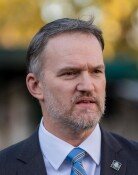Japanese PM’s talks do not care Seoul-Tokyo relationship
Japanese PM’s talks do not care Seoul-Tokyo relationship
Posted August. 16, 2021 07:18,
Updated August. 16, 2021 07:18
South Korean President Moon Jae-in said in a congratulatory speech of the nation’s 76th Liberation Day on Sunday, “South Korea will resolve historical issues by putting words into action based on universal values and norms shared across the international community,” skipping any direct remarks on Japan’s wartime sex slavery and forced labor. Moon sent a message to Tokyo, saying, “We always keep the door to dialogue open.” In the meantime, Japanese Prime Minister Yoshihide Suga only focused on the nations’ role in aggressively building peace as part of the international community, which would be preached by his predecessor Shinzo Abe, without any comment on its responsibility for the nation’s past invasive acts in a memorial ceremony to commemorate Japanese wartime victims.
This year’s messages from Seoul and Tokyo in commemoration of the Independence Day only highlight how they are stuck in a deadlock. President Moon did not propose any concrete initiative nor plan to improve the relationship with South Korea and Japan. Likewise, Japanese Prime Minister Suga only clarified his turn to the right side of the political spectrum. As President Moon’s visit to Tokyo and their summit talk have failed to become a reality around the opening ceremony of the Tokyo Olympics, they seem to be left helpless without any expectations for each other.
It was expected that President Moon will release initiatives for a turning point in the Seoul-Tokyo relationship, which has gone to the lowest level since it was established. Moon had raised his voice against Japan to call on it to apologize for its past wrongdoings until two years ago since he took office in 2017, but he has used a watered-down tone since last year to put more emphasis on the restoration of the Seoul-Tokyo relationship. Citing South Korean independence activist An Jae-hong’s speech made right after the liberation of the country, Moon stressed the significance of an inclusive historical view, which however turn out to be an empty message.
From Mr. Suga’s side, no signs of his will to restore the relationship were shown during his speech on Aug. 15. He limited his message to Abe’s idea to ensure aggressive peace-building efforts, which had been used as cause for a revision of the Constitution to include statements about Japan’s Self Defense Forces for the sake of international peace. The Japanese prime minister sent offerings to the Yasukuni shrine that honors A-class war criminals while five top officials of the Japanese cabinet including Defense Minister Nobuo Kishi paid a visit to the shrine in person. The feeling of “deep remorse,” which used to be mentioned by former Japanese prime ministers, has been left as a sole responsibility of Japanese Emperor Naruhito.
The more attempt either side makes, the greater headache the relationship between Seoul and Tokyo seemingly becomes. Both Moon and Suga seem to stay on the sidelines due to the upcoming elections and domestic political situations. If it is the case, they all will be remembered by the next generations as one of the worst leaders in history who leave an inerasable stain on the two nations’ relationship. In particular, President Moon’s initiative for a "Korean Peninsula model” is only empty talk without Japan in the frame. Even though both heads of the state have little time left, they should renew diplomatic efforts in practical terms to mend relationship.







